| When considering the array of 51 optional subjects for the UPSC Mains Examination, Sociology consistently stands out as a top choice. Its inherent appeal lies in its accessibility and intriguing exploration of humanity and society, catering even to students from Science and Commerce backgrounds. With a well-defined UPSC sociology syllabus comprising only 13 units, Sociology can be comprehensively covered within 5 to 6 Month Comprehensive “Foundation to Finale” Classroom Programme , Many of Our Sociology Foundation Course Students have Cleared CSE 2023- Kajal Singh, First Attempt (Age 22) Mahi Sharma, First Mains (Age 23), Anand Sharma First Mains and Many Others. Previously also Many students like IAS Pradeep Singh, IAS Ashish, IPS Bindu Madhav, IPS Aparna Gautam, IPS Shahnaz Illyas got Success in CSE in First Attempt with Sociology Optional.
IAS Medha Anand, has get 310 marks in her optional subject sociology, 156 in paper – 1 & 154 marks in Paper -2 in CSE 2023. Notably, Sociology for UPSC has garnered a reputation as one of the Highest scoring optional subjects in the UPSC Main Examination, with numerous candidates consistently achieving 300+. Its popularity is evident in the fact that a significant proportion of top 100 rankers opt for Sociology as their optional subject, showcasing its high scoring potential, particularly for those not from sociology backgrounds. Moreover, relevance of Sociology Optional Syllabus for UPSC extends beyond the examination hall, enriching understanding across various aspects of life, from social and economic to political and cultural domains. In recent times, Sociology Optional has gained traction, aligning with the evolving trend of the UPSC Mains towards conceptual analysis. Unlike other optional subjects with unpredictable question patterns, Sociology offers stability and predictability, making it an attractive choice. This adaptability, coupled with its concise syllabus and relevance to both academic and social spheres, positions Sociology as the ideal optional subject for engineers as well as optional subject for commerce graduates and optional subject for science graduates seeking success in the Civil Services Examination. For those pursuing Sociology as an optional subject, accessing comprehensive Sociology optional notes and few good Sociology optional books, and previous years’ UPSC sociology optional question papers is pivotal for thorough preparation. Additionally, for aspirants seeking guidance, renowned educator Vikash Ranjan Sir at TRIUMPH IAS coaching institutes in Delhi, offer valuable support and resources. Vikash Ranjan Sir is the Best Sociology Teacher and Triumph IAS is the |
Problems of Rural Labour, Bondage
Relevant for Civil Services Examination
Paper-2, Unit-13 [Rural and Agrarian transformation in India]
Problems of Rural Labour, BondageBondage can be conceptualized as a social condition when a person sells himself away’ to his employer on condition of specific economic privilege. It is a system of institutionalized slavery where the labour does not have independence and freedom of right to work. The service is rendered for debt or in lieu of the interest accruing to the debt. Bonded LabourLabour which remains in bondage for a specific period for the debt incurred are called bonded labour. The debtor agrees to mortgage his service or services of any or all members of his familyfor a specified or unspecified period. Two basic features
Types of Bondage: National Commission on Rural Labour spelled out those four kinds of bonded labour
Causes of bondage: The main causes of origin, growth and perpetuation indebtedness and bonded labour system are economic. Though the social and religious factors too support the custom. Economic factors
Social factorsExpenses on occasions like marriage, death, feast, birth of a child etc., leading to heavy debt (R.S.Sharma) Caste based discrimination
Religious factors:References from religious texts are given and religious arguments are used to convince the people of low castes that religion enjoins upon them to serve people of high castes. Illiteracy ignorance, immaturity and lack of stability and professional training sustain such attitude. Broadly speaking it may be concluded that bondage originates mainly from economic and social pressures.
Today’s Scenario – Magnitude of Bondage in India: Bonded labour system has been enlisting in Indian Society among agricultural labourers in the name of beggar and ryots. Today it has extended to workers working in brick kilns, bidi factories, stone quarries, glass factories and in detergent, carpet, gem stones and many other factories.
Steps taken and Suggestions:
This scheme has been revised in 2016.The quantum of financial assistance has been increased from 20 thousand to1 Lakh rupees. While the most deprived and marginalized like disabled female and children rescued from trafficking, sexual exploitation and transgender will get Rs. 3 Lakhs. The special category comprising of Females and minors who will now get Rs. 2 Lakhs. One of the special features of the new scheme is that it aims ot address new forms of bondage such as organized begging rings, forced prostitution and child labour for which females, disabled and trans genders are mercilessly used by the powerful elements.
Feminisation of AgricultureIndian agriculture is facing contradictory situation. On one hand rural rich is doing contract forming, employing new technology. While rural poor are migrating to cities in search of letter job opportunities. A regular migration of the small formers and agriculture labour to the urban areas or to other activities It has positive as well as negative consequences for women. Lets see positive one first
They are rearing goats, chicken and sometimes also selling vegetables in the market Nevertheless, It also affected them in negative ways.
Thus feminization of agriculture do contributing to upliftment of women but still it has not crossed the mark of good business for women. Indian agriculture needs modernization along with feminization to cater to women’s need of employment and business opportunities. The End of the Blog: Problems of Rural Labour, Bondage |
After Class Doubts Session of Students
with Vikash Ranjan Sir
Frequently Asked Questions by
UPSC Sociology Optional Students
- How to prepare for the Sociology Optional without coaching?
- Understand the syllabus thoroughly: Familiarize yourself with the entire syllabus for both Paper I and Paper II. Download the official UPSC syllabus and use it as your roadmap. You can attend Sociology Orientation Lectures by Vikash Ranjan sir on YouTube
- Build a strong foundation: Start with introductory textbooks and NCERT books to grasp core sociological concepts. You can start with Introduction to Sociology books
- Choose reliable study materials: Select high-quality textbooks, reference books, and online resources recommended by experts. You can opt for Vikash Ranjan Sir Notes too.
- Develop a study schedule: Create a realistic and consistent study schedule that allocates dedicated time for each topic. Stick to it and track your progress.
- Take notes effectively: Don’t just passively read. Summarize key points, create mind maps, or use other note-taking techniques to aid understanding and revision.
- Practice answer writing: Regularly write answers to past year question papers and model questions. Focus on clarity, structure, and critical thinking. Evaluate your answers for improvement.
- Seek guidance: You can take free Mentorship on Sociology Optional preparation by Vikash Ranjan sir. Connect with Vikash Ranjan sir (7303615329) to share strategies, ask questions, and stay motivated.
- Can I prepare for Sociology Optional without coaching?
Absolutely! Many aspirants successfully clear the exam through self-study. However coaching can provide structure and guidance, for time bound preparation.
- What are the benefits of preparing without coaching?
- Cost-effective: Coaching can be expensive, and self-study allows you to manage your resources efficiently.
- Flexibility: You can tailor your study plan to your individual needs and pace.
- Independence: You develop critical thinking and research skills, valuable assets for your career.
- What are the challenges of preparing without coaching?
- Discipline and motivation: You need self-discipline to stay on track and motivated without external guidance. Coaching and Teacher keeps you motivated.
- Access to resources: You may need to do extra research to find quality study materials and answer-writing practice opportunities. Teacher help you on this respect.
- Doubt clearing: You might lack immediate access to someone to address your doubts and questions. Teacher like Vikash Ranjan sir is accessible to his students 24×7 Mo- 7303615329
- What additional resources can help me?
- Vikash Ranjan Sir’s YouTube channel and website: Offers free Sociology lectures, study materials, and guidance.
- Triumph IAS website: Provides past year question papers, model answers, and other helpful resources.
- Public libraries and online databases: Utilize these resources for access to relevant books, journals, and academic articles.
Sociology Optional Program for
UPSC CSE 2025 & 2026
Follow us :
🔎 https://www.instagram.com/triumphias


